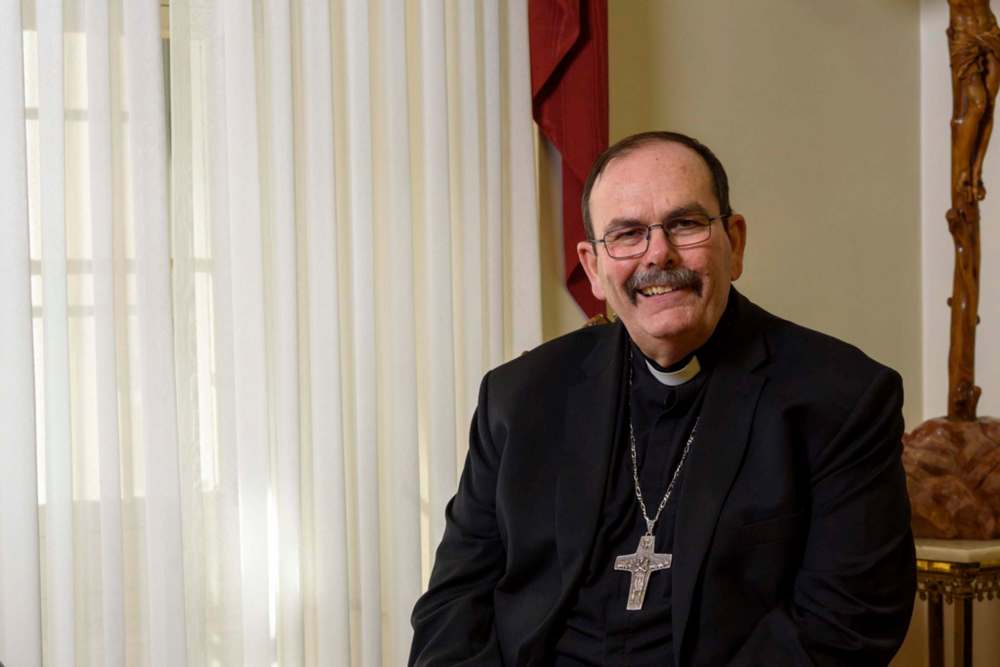Manitoba archdioceses seek to do part in national reconciliation
Advertisement
Read this article for free:
or
Already have an account? Log in here »
To continue reading, please subscribe:
Monthly Digital Subscription
$1 per week for 24 weeks*
- Enjoy unlimited reading on winnipegfreepress.com
- Read the E-Edition, our digital replica newspaper
- Access News Break, our award-winning app
- Play interactive puzzles
*Billed as $4.00 plus GST every four weeks. After 24 weeks, price increases to the regular rate of $19.00 plus GST every four weeks. Offer available to new and qualified returning subscribers only. Cancel any time.
Monthly Digital Subscription
$4.75/week*
- Enjoy unlimited reading on winnipegfreepress.com
- Read the E-Edition, our digital replica newspaper
- Access News Break, our award-winning app
- Play interactive puzzles
*Billed as $19 plus GST every four weeks. Cancel any time.
To continue reading, please subscribe:
Add Free Press access to your Brandon Sun subscription for only an additional
$1 for the first 4 weeks*
*Your next subscription payment will increase by $1.00 and you will be charged $16.99 plus GST for four weeks. After four weeks, your payment will increase to $23.99 plus GST every four weeks.
Read unlimited articles for free today:
or
Already have an account? Log in here »
Hey there, time traveller!
This article was published 29/09/2021 (1490 days ago), so information in it may no longer be current.
ROMAN Catholics in Manitoba will soon have a chance to participate in a three-year fundraising and education campaign to promote reconciliation.
The campaign in partnership with Indigenous people and organizations will begin later this fall, says Archbishop Albert LeGatt of the Archdiocese of St. Boniface.
“We are going to start with education in the parishes, make the case to the faithful for why it is important to donate,” he said.

The provincial campaign — part of a $30-million national fundraising and educational effort by the bishops across Canada — is “about more than raising money… it’s about showing, in word and action, that we want to pursue reconciliation through encounters between Indigenous and non-Indigenous people.”
The effort will be a collaborative effort between the Archdioceses of St. Boniface, Winnipeg, Keewatin-Le Pas, the Ukrainian Catholic Archeparchy of Winnipeg and the Archdiocese of Nunavut, which is headquartered in Churchill.
“In each diocese, the campaign could take different approaches,” LeGatt said, noting the Archdiocese of Keewatin-Le Pas is about 90 per cent Indigenous.
“By working together, we will help each other through joint administration and other ways.”
LeGatt emphasized the campaign will be done in consultation with Indigenous people and organizations provincially.
In the Archdiocese of St. Boniface, he will consult with the predominantly Indigenous parishes of Poplar River, Berens River, Bloodvein, Little Grand Rapids, Pauingassi, Hollow Water and Sagkeeng, along with their respective band councils.
“Whatever we do has to be built on collaboration and mutual respect,” he said, adding nothing will be done without involving Indigenous people. “For this campaign to be successful, we have to listen to each other.”
It also has to go beyond his office to the parish level. “It has to be more than the bishop’s word,” LeGatt said, noting he is hopeful there will be broad support among individual Catholics in the province’s parishes.
Funds raised will be disbursed in each archdiocese, in consultation with Indigenous people.
The national campaign, which was announced Monday, follows the apology to Indigenous people by Canada’s 90 bishops, meeting in plenary Sept. 20-24.
It will be conducted for up to five years and will include initiatives in every region of the country.
Bishop Raymond Poisson, president of the Canadian Conference of Catholic Bishops, expressed hope these efforts will make a significant difference in addressing historical and ongoing trauma caused by the residential school system.
“This effort will help support programs and initiatives dedicated to improving the lives of residential school survivors and their communities, ensuring resources needed to assist in the path of healing,” he said in a statement, noting funding for projects will be determined locally, in consultation with First Nations, Métis and Inuit peoples in each region.
In response to the apology and the decision to launch a national fundraising campaign, Grand Chief Arlen Dumas of the Assembly of Manitoba Chiefs said he was “hesitant,” noting he has “too many unresolved feelings over past atrocities.”
At the same time, he acknowledged the bishops for “expressing profound remorse and for ‘unequivocally’ apologizing for its role in running the residential schools. This is one small step on the long journey the Church must embark on for reparations to First Nations.”
faith@freepress.mb.ca
The Free Press is committed to covering faith in Manitoba. If you appreciate that coverage, help us do more! Your contribution of $10, $25 or more will allow us to deepen our reporting about faith in the province. Thanks! BECOME A FAITH JOURNALISM SUPPORTER

John Longhurst has been writing for Winnipeg's faith pages since 2003. He also writes for Religion News Service in the U.S., and blogs about the media, marketing and communications at Making the News.
Our newsroom depends on a growing audience of readers to power our journalism. If you are not a paid reader, please consider becoming a subscriber.
Our newsroom depends on its audience of readers to power our journalism. Thank you for your support.
The Free Press acknowledges the financial support it receives from members of the city’s faith community, which makes our coverage of religion possible.


